Nissan to discontinue diesel sales in Europe from 2021
08 May 2018

8 May 2018
Nissan has become the latest vehicle manufacturer to announce it will phase out diesel technology in Europe as sales in the continent continue to fall.
The Japanese carmaker will cease to launch any new passenger vehicles with a diesel engine from 2021, although it will continue to offer the option on commercial vehicles and pickup trucks, where the fuel remains dominant.
Manufacturers are continuing to abandon diesel power, with Toyota announcing it will stop selling diesel variants of its Yaris, Auris and RAV4 models in Italy, proclaiming itself ′diesel-free’ in the country, while it also plans to remove sales of the technology in France, as the European market adapts to consumer movement away from the fuel.
Fiat Chrysler Automobiles (FCA) will include, in a plan to outline the company’s future direction, a phasing out of diesel engines across the company’s brands, which include Jeep, Chrysler, Alfa Romeo and Fiat, from the European market. The company itself has declined to comment.
A Nissan spokeswoman said there would be a gradual withdrawal of diesel cars in Europe.
′Along with other manufacturers and industry bodies we can see the progressive decline of diesel, but we do not anticipate its sudden end in the short-term,’ the spokeswoman said. ′At this point and for many customers, modern diesel engines will remain in demand and continue to be available within Nissan’s powertrain offering.
′In Europe, where our diesel sales are concentrated, our electrification push will allow us to discontinue diesel gradually from passenger cars at the time of each vehicle renewal,’ she said.
Diesel sales in Europe have been dropping since 2015 and the Dieselgate scandal, however, the situation has worsened in the first three months of 2018. The diesel market dropped by 17% compared to the same period in 2017, with 1,574,333 units sold across the continent. This was offset by petrol sales, which rose 14.6%. Therefore, manufacturers are finding that there is no point in developing diesel technology as consumers move away.
Yet there may be hope for diesel technology, with German supplier Bosch recently announcing it has developed existing technologies to radically decrease nitrogen oxide (NOx) emissions, the main cause of air pollution from diesel vehicles. Daimler has also announced that it will use diesel powertrains in its new plug-in electric hybrid (PHEV) models.
Nissan, which through an alliance with Renault and Mitsubishi is the world’s largest manufacturer of passenger cars, already produces the biggest-selling purely electric car in Europe, the Leaf. The three companies, which are moving closer together under the leadership of Carlos Ghosn, plan to produce 12 purely electric car designs by 2022. Nissan wants half of its cars sold in Europe to be electric or hybrid by 2025.
The Japanese manufacturer is also expected to cut hundreds of jobs at its UK plant in Sunderland as it tackles the decline in the diesel market. Nissan builds its Qashqai and Juke volume models at the plant, which is Britain’s biggest automotive factory. According to data from the European Automobile Manufacturers Association (ACEA), the company’s sales in Europe dropped 10% in the first quarter of 2018.